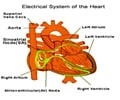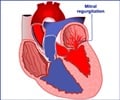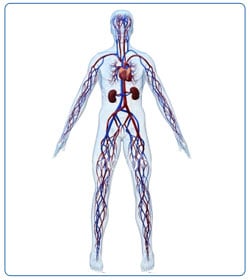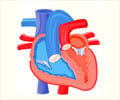Symptoms and Signs
Symptoms and signs of the two most common heart defects are described below.
Atrial Septal Defect (ASD)
On examination, a doctor can hear a heart murmur by auscultation. A murmur is a sound that is caused due to shunting of blood from one chamber to another through the defective hole. It denotes an abnormal blood flow pattern in the heart. Most babies born with atrial septal defects do not show any symptoms. They usually grow normally and feel well. Rarely they can present with fatigue and abnormal heart beat. Large ASDs can cause pulmonary hypertension and can affect the lung vessels permanently. Fortunately large ASDs are found and treated early before complications occur.
Link - Listen to/Download
Listen to Normal Heart Sound Listen to Atrial Septal Defect (ASD) Murmur
Ventricular Septal Defect
A heart murmur is present in babies born with ventricular septal defect. This is usually the first sign. Most often the murmur can be heard right after birth, but at times cannot be heard until the baby is a few weeks old.
Most infants do not have symptoms with a small VSD. On the other hand, babies with large VSDs can develop heart failure. Within the first two months of life, infants can have breathing difficulties, fluid build up in their extremities or even lungs. Infants do not eat well and there can be poor growth. After infancy, there may not be any symptoms because the hole either reduces in size or is treated by intervention.
Teenagers or adults with a small VSD may have no symptoms during life. These individuals will have to go the doctor regularly and be monitored for any changes or problems.
Link - Listen to/Download
Listen to Normal Heart Sound Listen to Ventricular Septal Defect (VSD) Murmur

















